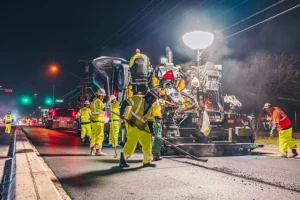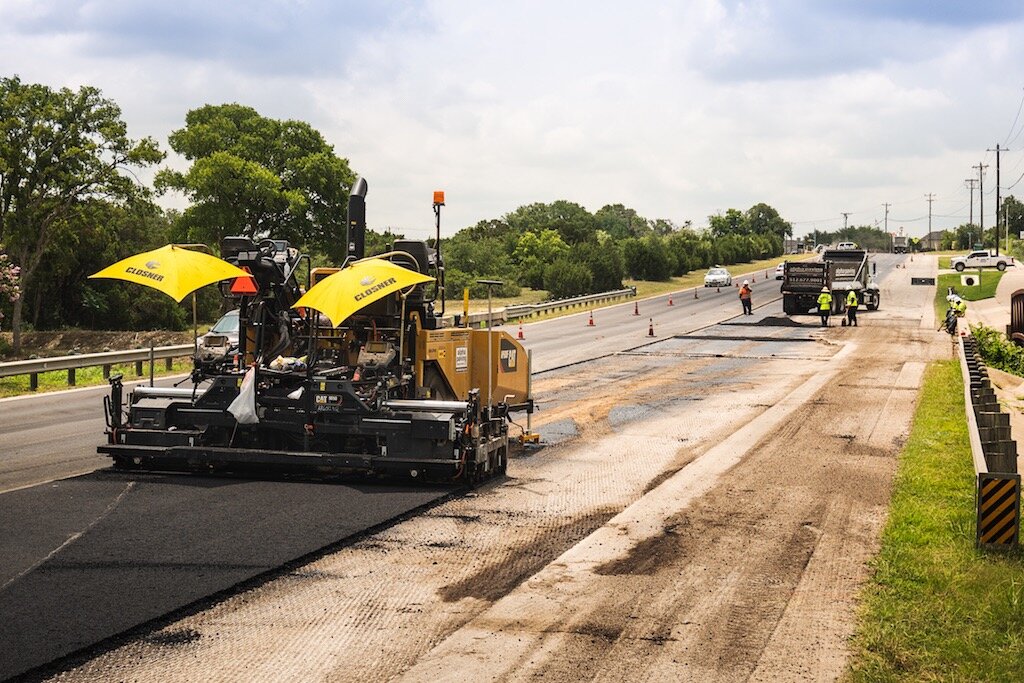Asphalt paving is more complicated than most people realize. If you have ever driven by a site where crews are installing new pavement, you might have had the impression that the crew needed merely to roll the material deposited by the dump trucks. However, numerous steps preceded the rolling machine’s final pass. Whether they are building an entirely new road, installing an asphalt overlay or reconstructing an aged pavement, asphalt contractors must follow a strategic process to ensure quality results.
What Is the Process for Asphalt Road Construction?
Every project is different, so some roads will not require all of these steps. Conversely, some asphalt road construction projects will require additional work from the contractor. Typically, however, these are the necessary steps needed.
- Design: The contractor will consider the loads that the pavement will bear. Loading includes the number of vehicles and their weights. The contractor will also evaluate the soil conditions and the terrain to help craft a design.
- Planning: The contractor will plan the best way to execute the design. Preparation includes traffic control measures, the timing of the loads from the bitumen plant, the movement of the contractor’s equipment to the site and the crew members needed for the job. The contractor will also determine whether the work will need to be divided into logical, efficient phases.
- Clearing: On new construction, the contractor will need to clear away bushes, trees, and other vegetation, but if the project is a reconstruction, he will need to remove the existing pavement.
- Grading: The pavement must have the proper slope if it is to drain correctly. Paving contractors may need to use heavy equipment to shape the roadbed so that it is slightly higher in the center. After shaping, crew members use machinery and hand tools to smooth and level the surface.
- Foundation: The foundation consists of a compacted subbase and base. The foundation is an essential part of subterranean drainage, but it is also a critical component that gives strength, support, and flexibility to the pavement. Foundation designs can vary, so depending on the soil, planned usage and terrain, the contractor will select the appropriate foundation materials during the design phase.
- Courses: After the contractor tests the subbase to ensure proper compaction and grade, he can apply a binder layer. The next step is to apply the first asphalt course and compact it. The number of courses needed varies, but the final session is the surface layer. Asphalt contractors typically use a mix containing smaller aggregate particles for the surface layer than they use for the underlying courses.

What Are the Steps Involved In an Asphalt Overlay?
An overlay is faster and less expensive to install. However, some pavements are not suitable for overlays. For example, if the foundation is unstable or alligator cracking is extensive, reconstruction is usually a more cost-efficient choice. The basic steps for installing an overlay are as follows.
- The asphalt contractor will inspect the pavement to determine the cause of the damage. Without addressing the reason, the overlay will suffer the same type of damage.
- The contractor will probably take several core samples to check the condition of the foundation.
- Crew members will thoroughly clean the pavement to remove sand, debris, gravel, and vegetation.
- In some instances, it may be necessary to make repairs before installing the overlay. For example, deep ruts may need to be filled to keep the new surface level.
- The contractor may choose to apply a tack coat. Although they are not necessary for all jobs, tack coats can help the overlay bond to the existing pavement.
- New paving material is applied, compacted and finished.
If you need a reliable, experienced paving contractor to help with your asphalt road construction and street maintenance, contact Alpha Paving. We install asphalt paving and overlays, and we also offer repairs, asphalt sealcoating, asphalt milling, parking lot striping, concrete work, and many other pavement-related services. Our clients include many municipalities, subdivisions, HOAs, counties, shopping malls, apartment complexes, office parks, industrial facilities, universities, health care facilities, religious institutions, and retailers. We have excellent references and an exemplary reputation. We offer free quotes, so request yours by calling us at 512-677-9001 or completing the online form.




